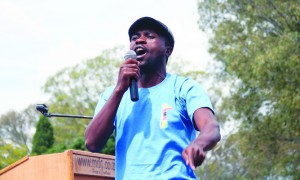Ishmael Kauzani, a courageous pro-democracy activist, was abducted and severely assaulted on the night of December 1, 2016 by unknown men who accused him of being a member of the pressure group Tajamuka.
Kauzani was on his way home when a twin-cab forced the kombi he was travelling in to stop and the twin-cab occupants ordered him out. When he refused, the men started shooting and grabbed Kauzani while the other people scattered in terror.
After beating Kauzani initially with heavy sticks, they drove to a forest where they beat him further, stripped off his clothing and then drove a car over his legs, breaking one of them.
Fortunately his body was dumped near a bar where he was found and taken to hospital. He is currently in a critical condition in intensive care.
The courage and tenacity of men like Ishmael Kauzani is all the more remarkable when one realises just how much he has endured due to his commitment to restoring democracy and human rights in Zimbabwe.
Kauzani was a founder member of the Movement for Democratic Change (MDC) party which was launched in 1999 to challenge President Mugabe’s corrupt, incompetent and increasingly unpopular government and its mismanagement of the economy.
In 2004, Kauzani was arrested on the trumped charge of setting fire to a bus and was held in a remand prison for six months.
In 2007, after the brutal March 11 attack on civic and opposition leaders, including MDC President Morgan Tsvangirai, who were assembling for the Save Zimbabwe campaign prayer meeting in Harare, Kauzani was again arrested and accused of sabotage and terrorism.
The police claimed that Kauzani and his colleagues, who included two MPs, had been trained in terror activities in South Africa.
They were brutally tortured in police custody, denied medication and access to their lawyers, and were held for 13 days. After an international uproar, they were finally released.
Despite his life being in constant danger, Kauzani continued with his political activities, determined to help the MDC win the 2008 Presidential and Parliamentary elections, Mugabe’s toughest election challenge to date.
Mugabe was unable to secure an outright win during the first round, despite accusations of massive vote rigging. After refusing to announce the results for a month while he and his henchmen strategised, a run-off election was finally called by the pliant Zimbabwe Electoral Commission.
Immediately Mugabe and his Joint Operations Command team set in motion the worst campaign of violence since the Gukurahundi massacres (1983-1987), which began just three years after independence.
As a result of the massacres – more than 20,000 men, women and children are believed to have been killed – Joshua Nkomo’s ZAPU party was effectively silenced and the Mugabe machinery came closer to achieving its stated goal: a one party state with Mugabe as president for life.
Just over two weeks into the 2008 run-off election, Kauzani was arrested and heavily assaulted on April 19. He suffered a broken rib, soft tissue injuries and severe trauma. He was hospitalised for two weeks.
With fears for his life intensifying, Kauzani was forced to flee to South Africa on May 7, leaving behind his wife and their ten-year-old daughter.
Soon after arriving in South Africa, he learnt that his older brother, Godfrey Kauzani, MDC activist Beta Chakururama and others had been abducted by unidentified men. Chakururama was later found stabbed to death in a river bed in Murewa, Mashonaland East province.
Godfrey Kauzani (32) was found dead on May 11 in Goromonzi, also in Mashonaland East province. Their father, Enos, said that his son’s body had been found with several stab wounds, he did not have a tongue and his eyes had been plucked out.
Adding to the horror, his body had been half burnt, there was wire around his neck and his hands had been tied together with more wire.
In South Africa, the highly traumatised Ishmael Kauzani received medical attention but due to the extent of his injuries and the shock of losing his brother, recovery was slow.
Without a secure source of financial assistance and lacking the strength for physical labour – one of the few means of earning an income available to refugees, he struggled to survive.
During August 2016, Kauzani participated in a demonstration against police brutality in Harare and was charged with public violence.
Then, on November 18, he was abducted with Patson Dzamara and two other comrades. Patson is the brother of Itai Dzamara, who was abducted In March 2015 and is still missing. He is believed to have been killed by Central Intelligence Organisation operatives.
All four actaivists were savagely assaulted, threatened and left for dead. After being rescued, Dzamara said he thought they would “never live to tell the taleâ€.
Ben Freeth, executive director of the Mike Campbell Foundation, urges the international community to condemn the violent and wicked actions of state security agents and call for their arrest and for justice to take its place.
“An investigation under the Special Rapporteur for torture needs to take place,†he said.
Post published in: Featured


